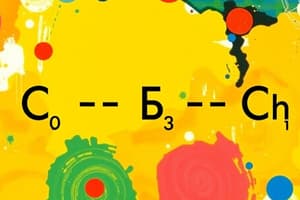Podcast
Questions and Answers
What is a monatomic ion?
What is a monatomic ion?
- A compound composed of molecules
- A compound that produces hydrogen ions
- A single atom with a positive or negative charge (correct)
- A tightly bound group of atoms
Which of the following describes a polyatomic ion?
Which of the following describes a polyatomic ion?
- A compound of two elements
- A compound that produces hydroxide ions
- A group of atoms that behaves as a unit and has a charge (correct)
- A single atom with a charge
What is an anion?
What is an anion?
Any atom or group of atoms with a negative charge
What is a cation?
What is a cation?
What defines an ionic compound?
What defines an ionic compound?
What is a molecular compound?
What is a molecular compound?
What is a binary compound?
What is a binary compound?
Define an acid in terms of its properties in solution.
Define an acid in terms of its properties in solution.
What is a base?
What is a base?
What does the law of definite proportions state?
What does the law of definite proportions state?
State the law of multiple proportions.
State the law of multiple proportions.
What is the chemical formula for potassium hydroxide?
What is the chemical formula for potassium hydroxide?
What is the chemical formula for potassium chloride?
What is the chemical formula for potassium chloride?
Provide the chemical formula for sodium chloride.
Provide the chemical formula for sodium chloride.
What is the chemical formula for calcium hydroxide?
What is the chemical formula for calcium hydroxide?
What is the formula for hydrochloric acid?
What is the formula for hydrochloric acid?
What is the formula for sulfuric acid?
What is the formula for sulfuric acid?
Provide the chemical formula for nitric acid.
Provide the chemical formula for nitric acid.
Flashcards are hidden until you start studying
Study Notes
Chemical Compounds and Ions
- Monatomic ion: A single atom carrying a charge due to the loss or gain of valence electrons.
- Polyatomic ion: A group of atoms tightly bonded together, exhibiting a collective charge.
- Anion: Any negatively charged atom or group of atoms.
- Cation: Any positively charged atom or group of atoms.
Types of Compounds
- Ionic compound: Composed of both positive and negative ions, typically formed from metals and nonmetals.
- Molecular compound: Composed of molecules, usually formed from nonmetals.
- Binary compound: Contains only two different elements.
Acids and Bases
- Acid: Produces hydrogen ions (H⁺) when dissolved in solution.
- Base: Produces hydroxide ions (OH⁻) in solution.
Laws of Chemical Composition
- Law of definite proportions: In any chemical compound, elements are always present in fixed mass proportions by weight.
- Law of multiple proportions: For two elements forming multiple compounds, the mass ratios of one element combine with a fixed mass of the other in small whole number ratios.
Common Chemical Formulas
- Potassium Hydroxide (KOH): A strong base.
- Potassium Chloride (KCl): A common salt.
- Potassium Oxide (K₂O): An oxide of potassium.
- Potassium Sulfate (K₂SO₄): A sulfate salt.
- Sodium Hydroxide (NaOH): A strong base, also known as lye.
- Calcium Chloride (CaCl₂): An ionic compound used for melting ice.
- Water (H₂O): Essential for life and the universal solvent.
- Hydrochloric Acid (HCl): A strong acid, used industrially and in digestion.
- Sulfuric Acid (H₂SO₄): A strong acid, widely used in battery manufacturing.
Additional Acids
- Ammonia (NH₃): A basic compound, used in fertilizers.
- Phosphoric Acid (H₃PO₄): Used in food flavoring and fertilizers.
- Nitric Acid (HNO₃): Used in explosives and fertilizers.
- Acetic Acid (CH₃COOH): Known as vinegar, used in food preservation.
- Oxalic Acid (H₂C₂O₄): Used as a cleaning agent and in industrial processes.
Iron and Magnesium Compounds
- Iron (II) Hydroxide (Fe(OH)₂): A basic compound, can be used in water treatment.
- Iron (II) Sulfate (FeSO₄): Used in fertilizers and water treatment.
- Magnesium Hydroxide (Mg(OH)₂): A weak base, often used in antacids.
- Magnesium Oxide (MgO): Commonly used as a refractory material.
Aluminum Compounds
- Aluminum Hydroxide (Al(OH)₃): Used as an antacid and in water purification.
- Aluminum Oxide (Al₂O₃): Used in abrasives and as a refractory material.
Acids with Unique Properties
- Hydrosulfuric Acid (H₂S): Known as hydrogen sulfide, it has a characteristic foul smell.
- Hydrofluoric Acid (HF): A weak but dangerous acid used in glass etching.
- Perchloric Acid (HClO₄): A strong acid used in rocket propellant manufacturing.
Various Forms of Acids
- Different names and formulas for acetic acid include C₂H₄O₂ and HC₂H₃O₂.
- Other acids such as nitrous acid (HNO₂) and sulfurous acid (H₂SO₃) have varied industrial applications and uses in organic synthesis.
Studying That Suits You
Use AI to generate personalized quizzes and flashcards to suit your learning preferences.




